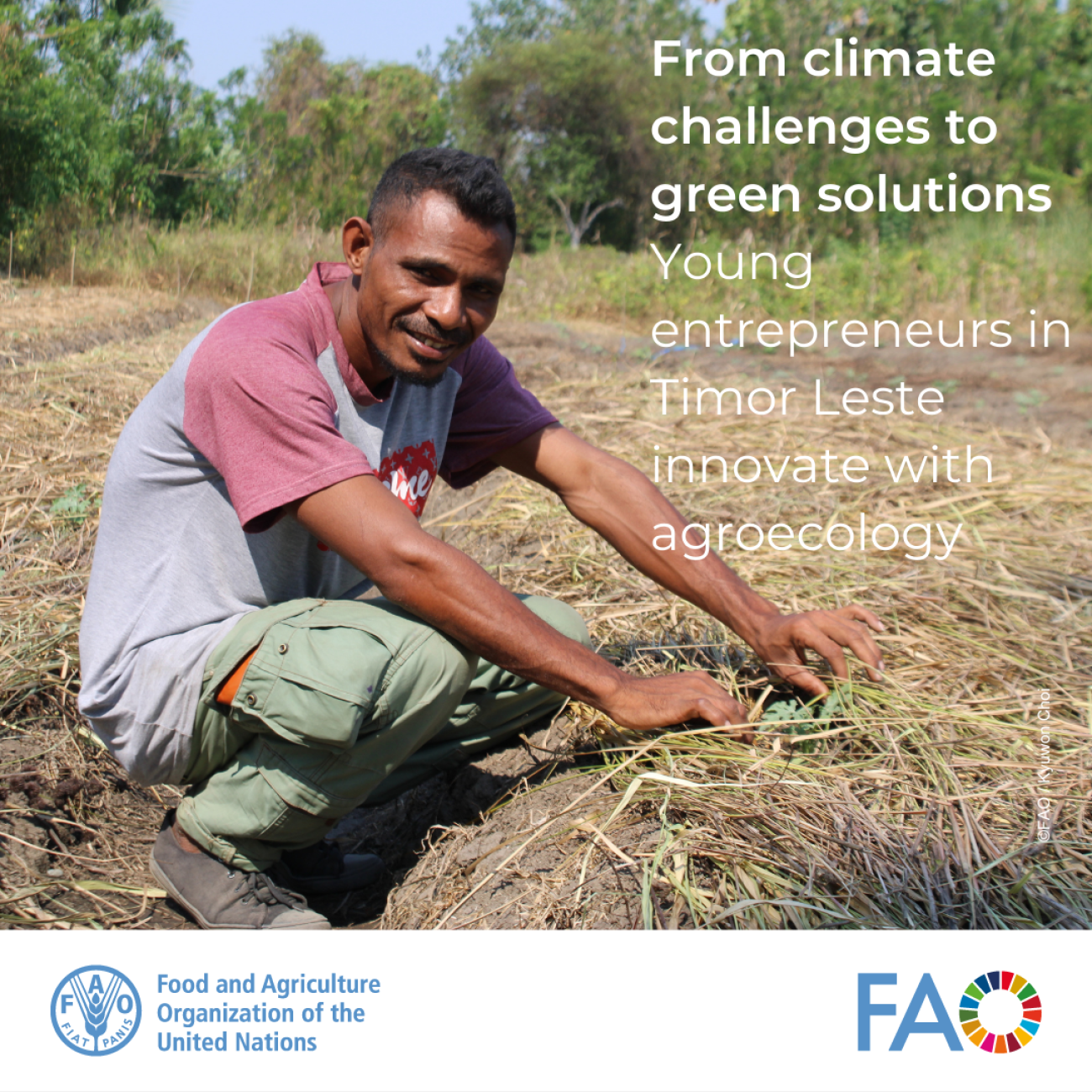From climate challenges to green solutions Young entrepreneurs in Timor Leste innovate with agroecology

In the heart of Timor Leste's rural landscape, a revolution is underway.
Young entrepreneurs like Pascoal da Costa Fernandes are transforming agriculture through agroecological practices, driving productivity, and fostering resilience against climate change.
This transformation is supported by FAO’s Green Jobs for Rural Youth Employment project, which aims to create green jobs and support governments in transitioning to a green economy.
Pascoal's journey began with a vision to transcend traditional farming methods. After studying at the National University of Timor-Leste, he returned to his hometown of Manufahi to help on his family's farm. He saw potential where others saw limitations. “I believed I could produce a variety of crops as well as raise animals,” he says, reflecting on the barriers he encountered, including the farm's limited crop diversity and income.
Opportunity knocked when Pascoal learned about the Green Jobs for Rural Youth Employment project, funded by the Korean International Cooperation Agency (KOICA) and implemented by FAO. This initiative, also active in Sierra Leone and Zimbabwe, leverages the agricultural sector to create green jobs and support the transition to a green economy. Selected youth participants receive soft and technical skills training, joining either the Green Entrepreneurship Track or Wage Employment Programmes.
Pascoal joined the Green Entrepreneurship Track, which offered him technical and business mentorship and grant support. FAO’s involvement included organizing training programmes and mentorship through the Ministry of Agriculture, Livestock, Fisheries and Forestry, equipping Pascoal with agroecological techniques to design and operate an organic integrated farm. “I learned how to grow different crops in both dry and rainy seasons, cultivate them, and produce compost and animal feeds by ourselves,” Pascoal explains.
With these skills, Pascoal's farm began to flourish. He and his colleagues successfully planted over ten different horticultural crops and raised cattle and chickens, their increased productivity enabling them to supply five supermarkets in Dili.


Left/top: Pascoal da Costa Fernandes and his family members in his integrated farm. Right/bottom: Watermelon seedlings grown by Pascoal waiting to be planted. ©FAO/Kyuwon Choi
“By diversifying the farm crops, we were able to increase productivity as well as our incomes,” Pascoal says. “This year, we earned USD 500 from cucumbers, USD 1 000 from watermelons, and USD 600 from poultry farming. Increased understanding of conservation agriculture and environmental preservation allowed us to do year-round crop production, which led us to build confidence within our family, our village neighbours, and our customers in Dili.”
Pascoal’s efforts have also revitalized his community. He employs young villagers as seasonal workers for tasks like land preparation and crop harvesting. “I am now able to provide employment to my village people,” Pascoal says. “The green jobs we've created on the small farm are revitalizing my home village.”
FAO’s role in providing training and support has been crucial in Pascoal’s adoption of agroecological practices. He produces organic fertilizer using farm resources like cow manure and local grasses, which safeguards soil health and protects crops from diseases and pests. For instance, covering soil with rice straw while planting watermelon seedlings protects crops from high temperatures and activates beneficial microorganisms.
His farm’s cycle includes over ten different horticultural crops, organized into zones and sub-zones for rotational cultivation. This method controls pests and increases productivity by balancing soil nutrients. Pascoal also grows some crops specifically for livestock feed, reducing reliance on imported feeds and protecting his farm from market fluctuations.
Pascoal’s approach exemplifies how agroecology can build resilience and sustainability. His practices reduce dependence on petroleum-based fertilizers and pesticides, increase soil health, and organically manage temperature, pests, and nutrition.
Pascoal’s story is a testament to the transformative power of agroecology and the impact of strategic support for young entrepreneurs. Through FAO’s Green Jobs for Rural Youth Employment project, Pascoal has not only improved his own livelihood but also contributed to his community's development and environmental sustainability.

A cow on Pasocal's farm eating locally-grown feed. ©FAO/Kyuwon Choi
FAO’s involvement in the Green Jobs for Rural Youth Employment project is part of a broader narrative aimed at creating green jobs and supporting the transition to a green economy by harnessing the agricultural sector's potential. Recommendations from youth and lessons learned feed into policy processes, strengthening government capacities in youth employment, sustainable agriculture, and environmental preservation.
Through FAO’s efforts, young entrepreneurs like Pascoal are leading the way in creating sustainable, resilient agricultural systems. Their efforts highlight the importance of supporting young farmers and embracing agroecological practices to address climate change and promote rural development.









